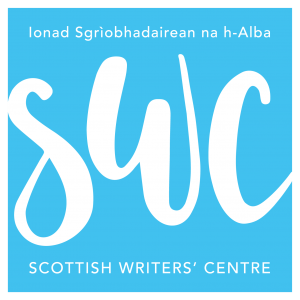A huge thank you to all our audience and speakers for a really interesting and thought-provoking Speakeasy at the CCA on Tuesday night. The diversity and depth on show make these events the most fun of all at the SWC.
Ian Hunter kicked off proceedings with his brilliant parody of the narcissistic world of the contemporary Turner-Prize aspirant artist, one Duncan McKenzie (apologies to any namesakes out there) whose quest for ever more hipply glib and solipsistic art works leads him by stages to the ultimate ‘happening’: the stalking of an innocent café owner who consequent personal disintegration finally delivers the story’s satisfying denouement. I loved it. But the Big Issue says “crap”.
Then Suzanne Phinn treated us to a swan song sing song, a veritable poetic curiosity, illustrating the voyage of a pink car through evergreen songs of past decades. You just had to be there. And join in.
John O’ Connor gave us perhaps the most innovative and mind-bending offering of the night. Apparently working from handwritten notes, his druggish stream of consciousness took us across diverse times and places, from which I managed to scribble down a few key phrases which are still haunting me, like: “pivotal rooms, last train to hell, the boy who stole Attila The Hun’s horse” Any poet who quotes Nietzsche is a friend of mine. John doesn’t even have email, he’ll probably never read this. But wow, John, wow, we need more craziness like this.
Just when we thought things might turn normal, Rick Rennie, a man who learned Gaelic late in life and has been delighting in it ever since, treated us to an imagined street conversation between a Doric Aberdonian and a Gaelic fisherman. The effect was educational and humorous, strikingly illustrating the cultural diversity of Scotland in condensed format.
Anne Marie Madden then read out her deeply affecting short story concerning how the news of a cancer diagnosis is shared between two married partners. The unflinching simplicity of this tale achieved the seemingly impossible with such a grave theme: the beauty of art itself redeemed the reader and the listener.
Rosemary Morgan, the first Quaker we have been honoured to hear perform at the SWC, gave us a poetic quartet called ‘Pathways through loss’ from which these beautiful lines still ring in my head: “sweet sadness.. sliding softly into slumber, we speak of things you never spoke of in life.”
Peter Russell gave us a selection of poems displaying his usual blend of classical erudition, staunch socialism and delicately observed details of ordinary people’s lives. A remembered fishing trip with his father yielded these wonderful lines: “stillness of fishing with you… cast nets for words like eels… reel in the memories”.
Maria Venditozzi took the floor with four tender poems which showed the focussed eye of Buddhist meditation, culminating in the powerful image of a butterfly, maimed by accident and dying in the narrator’s hand, metaphorically fused with the life of a loved one.
Muriel Baker pricked us all with her Trio ‘Sharps’, exploring the things in our lives that can both hurt and mend, from words to needles, from daughters to mothers and the acquired ability to answer back.
The evening then underwent another shocking gear change as the otherwise charming gentleman poet Charlie Gracie read us out a horrifying short story concerning a Glaswegian couple mutually attracted to the idea of murdering someone. Part of a novel, that will surely find its place among Glasgow’s panoply of contemporary crime-writing belters sooner rather than later.
By way of light relief after murky Clydeside darkness, Kerrie Ross (was that an Ozzy accent?) gave us a humorous short story concerning a belly-dancing troupe called The Sisterhood and their embittered battle with the rising cult of Zoomba. Unlikely phrases like “shimmying boils the ovaries” made exercise of the facial muscles unavoidable. But “a prolapse is no laughing matter.”
Ann McKinnon, seemingly a master of the short poem in Scots, gave us four up to her usual standard, on topics ranging from environmental damage (the midden we’ve made o’ the world), via food banks, Glasgow School of Art on fire, to the fine conclusion of her reassuring a Polish immigrant “nae tae fret, we dinnae speak English here anyhoo.”
This was a night for good short stories, and most important of all perhaps, for listeners of every generation to hear, was Ingrid Lees’ recollection of her and her brother Manfred being reunited with their father after World War Two. She had survived the ruins of Berlin and he service in the German army. Ingrid’s memories of the strangely perceptive misconceptions of a child’s mind were telling: her fear that the undiscussed wrong-doing of her father could be as tangible and heritable as the coloured fur of her pet rabbits. Ingrid’s theme of how families are torn apart by war, interspersed with ironic overtones on the absurdity of eugenics, look like being relevant for generations to come, unless we address the rise of racism that recurs around us even now.
Susan Muir then gave us two poems about the power and turmoil of the sea and two about dance. Ending as they did with the topic of a Friday night out in Glasgow, these skilfully handled themes were a good deal more connected than one at first thought !
Finola Scott roared onto the stage in full performance-poet mode, beginning with a wry and clever poem about bird-feeding, then moving bravely into the taboo topic of child abuse. Hers were very humane poems, as best evidenced in ‘Spirals’ exploring the matryoshka doll nature of motherhood across three generations, and ending on the recently momentous topic of Scotland’s independence referendum.
Entering injury time as it were, Bob Chessar rose to give us a warm and witty rendition of a Tam O’ Shanter inspired ballad, what better way to end than with our national bard.
If only yours truly, Douglas Thompson, had not given in to public demand (well, Charlie Gracie actually) and finished off the evening with one of his own ditties. A poem about the “Victorian corsetwork” of the roof of Glasgow’s Central Station, concluding with the request that his dead body be left there one day “…with a train fare in my pocket and a poem folded as sacrament, on my tongue still vibrating, as the hammer of a broken bell.” Well, it sounds cooler than cremation 🙂
~



